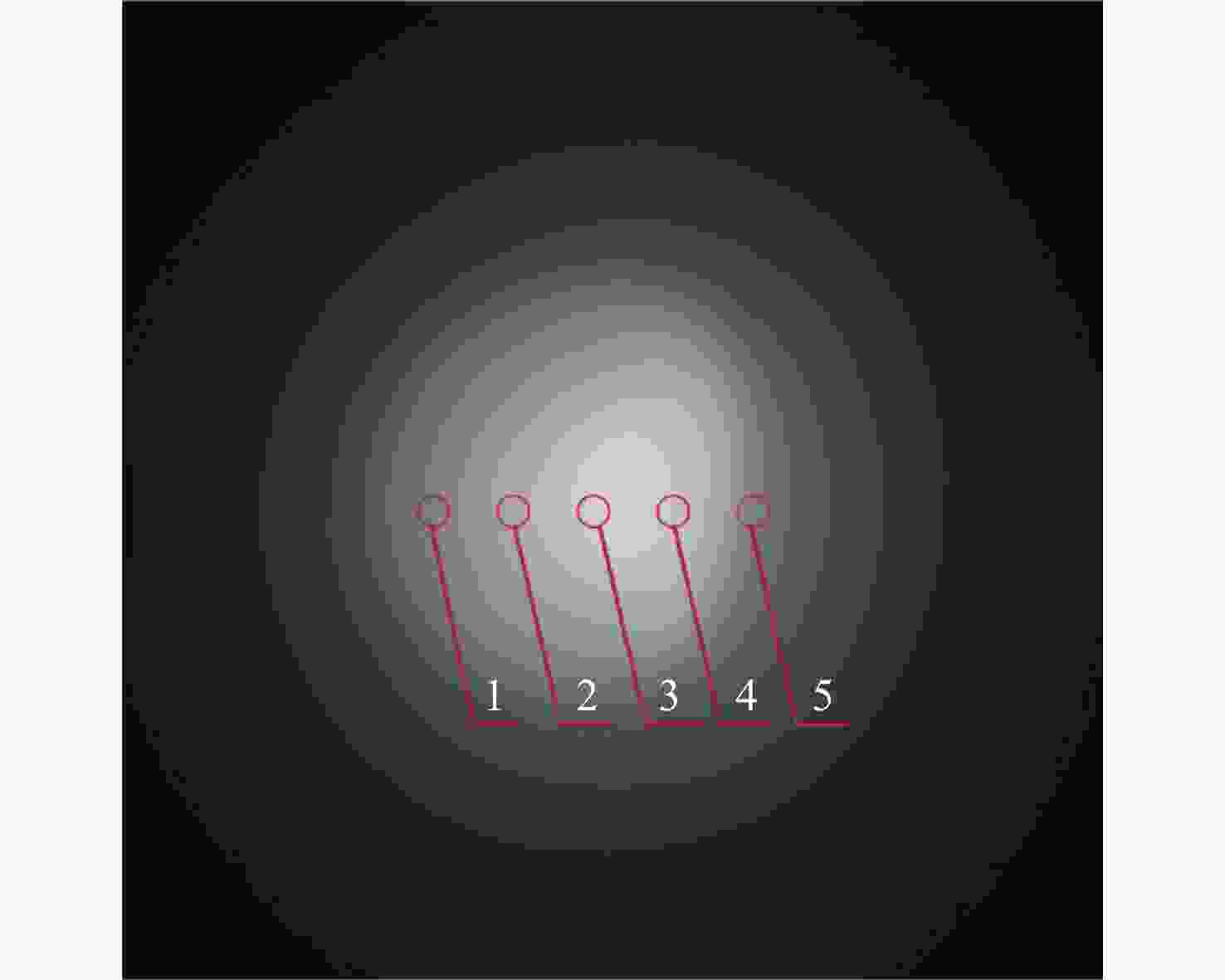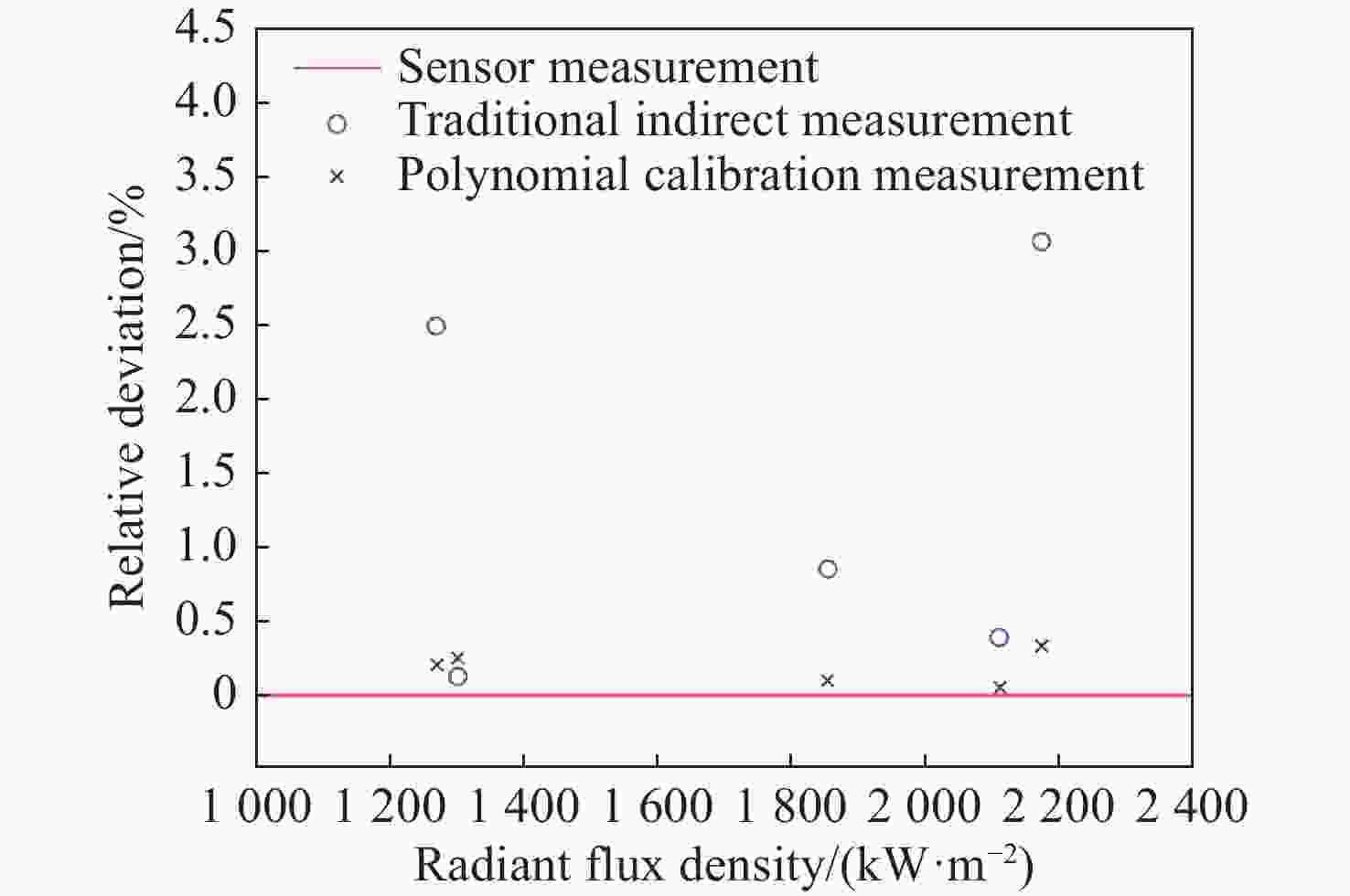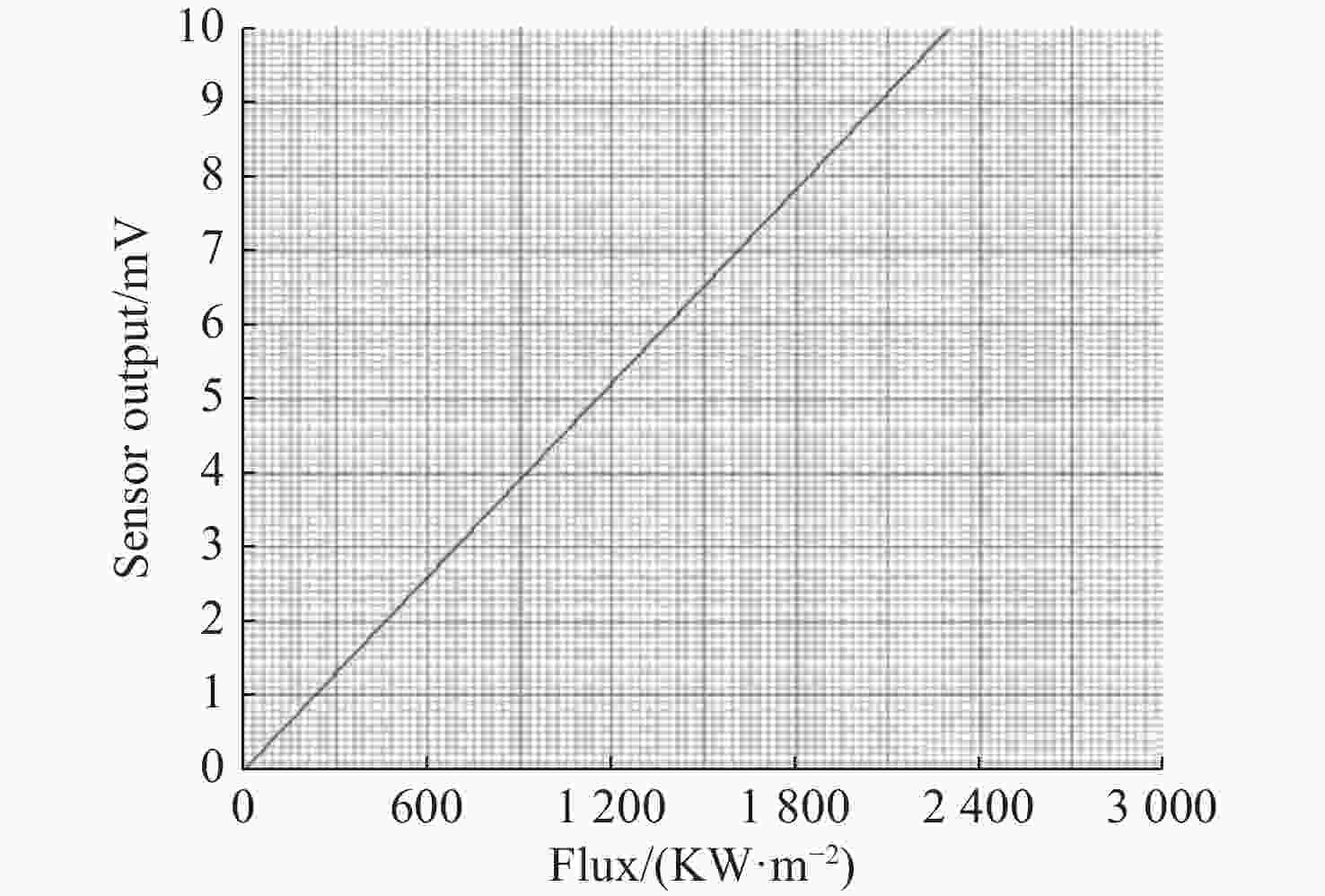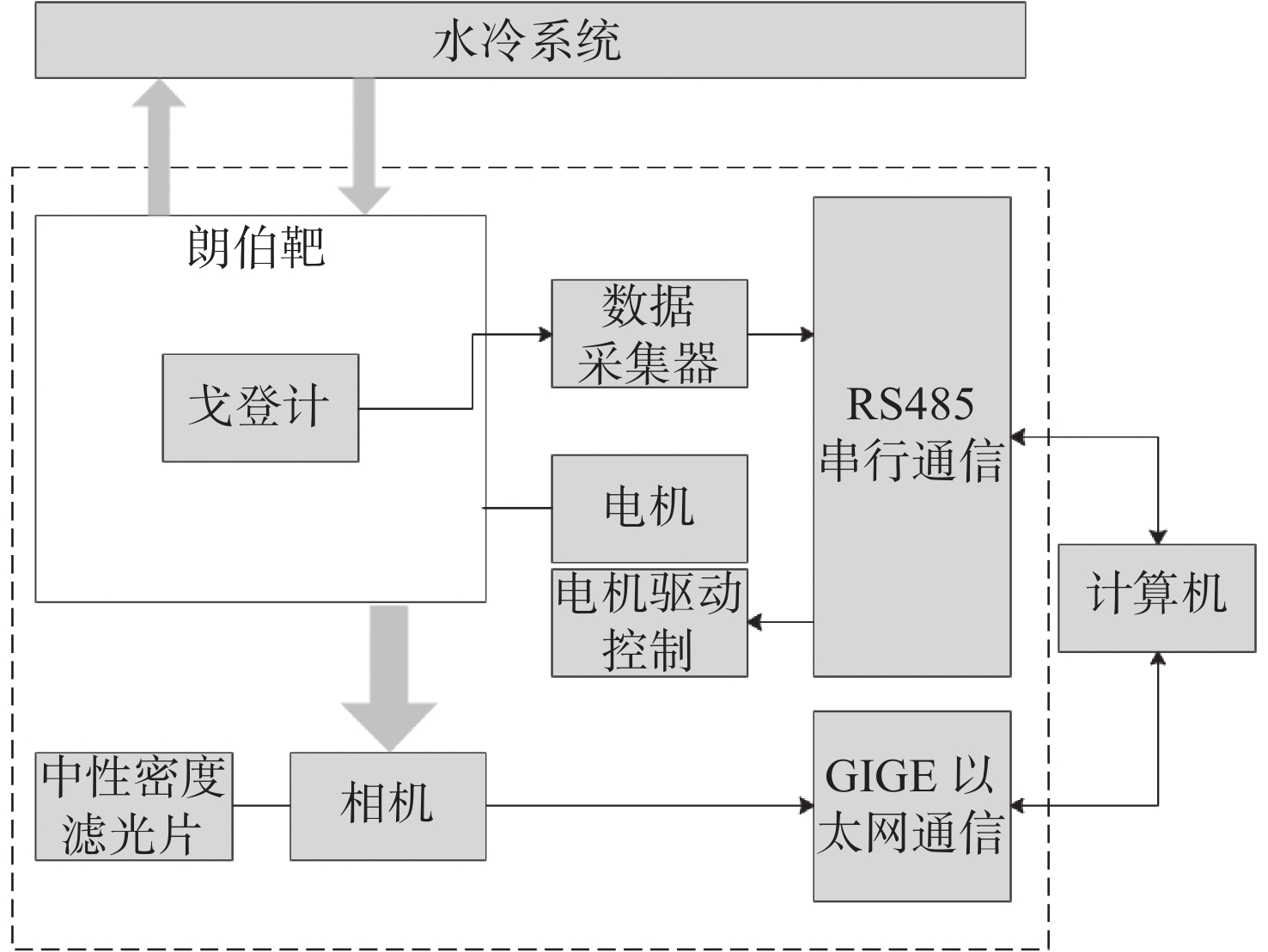-
摘要:
本文提出了一种高倍汇聚辐射光斑能流分布测量新方法,采用辐射能流传感器测量光斑不同位置的能流密度,通过多项式拟合光斑不同位置的灰度与能流密度标定曲线,最终获得辐射光斑的能流分布,并详细阐述了辐射光斑能流分布的测量原理。为了验证测量方法的准确性和可行性,进行了高倍汇聚辐射光斑能流分布测量实验,并与辐射能流传感器测量结果进行比较。结果表明:该测量方法的测量结果与辐射能流传感器的直接测量结果一致,测量偏差小于0.54%,通过分析得出该测量方法的测量不确定度为4.35%,测量准确度较传统测量方法有所提高,满足实际应用需求。
Abstract:A new method for measuring the flux distribution of a high-magnification convergent radiation spot is proposed. A radiation flux sensor is used to measure the flux density at different positions of the spot, and the calibration curve of the grayscale and flux density at different positions of the spot is fitted by a polynomial, and finally the flux distribution of the radiation spot is obtained and its principle is also elaborated. In order to verify the accuracy and feasibility of the measurement method, a high-magnification convergent radiation spot flux distribution measurement experiment is carried out, and the results are compared with the direct measurement results from the radiant flux sensor. The results show that the measurement results of the proposed method are consistent with the direct measurement results, and the average deviation is less than 0.54%. Through analysis, the measurement uncertainty of this measurement method is 4.35%, and the measurement accuracy is higher than the traditional measurement method. The experimental results indicate that the proposed method can meet the needs of practical applications.
-
Key words:
- measurement system /
- radiation spot /
- flux distribution /
- photogrammetry /
- flux density
-
-
[1] SARWAR J, GEORGAKIS G, LACHANCE R, et al. Description and characterization of an adjustable flux solar simulator for solar thermal, thermochemical and photovoltaic applications[J]. Solar Energy, 2014, 100: 179-194. doi: 10.1016/j.solener.2013.12.008 [2] ERICKSON B M. Characterization of the Universiy of Florida solar simulator and an inverse solution for identifying intensity distributions from multiple flux maps in concentrating solar applications[D]. Gainesville: University of Florida, 2012. [3] KRUEGER K R, LIPIŃSKI W, DAVIDSON J H. Operational performance of the University of Minnesota 45 kWe high-flux solar simulator[J]. Journal of Solar Energy Engineering, 2013, 135(4): 044501. doi: 10.1115/1.4023595 [4] KRUEGER K R. Design and characterization of a concentrating solar simulator[D]. Minnesota: The University of Minnesota, 2012. [5] LI J, GONZALEZ-AGUILAR J, PÉREZ-RÁBAGO C, et al. Optical analysis of a hexagonal 42kWe high-flux solar simulator[J]. Energy Procedia, 2014, 57: 590-596. doi: 10.1016/j.egypro.2014.10.213 [6] GILL R, BUSH E, HAUETER P, et al. Characterization of a 6 kW high-flux solar simulator with an array of xenon arc lamps capable of concentrations of nearly 5000 suns[J]. Review of Scientific Instruments, 2015, 86(12): 125107. doi: 10.1063/1.4936976 [7] XU J L, TANG CH, CHENG Y P, et al. Design, construction, and characterization of an adjustable 70 kW high-flux solar simulator[J]. Journal of Solar Energy Engineering, 2016, 138(4): 041010. doi: 10.1115/1.4033498 [8] LI X, CHEN J L, LIPIŃSKI W, et al. A 28 kWe multi-source high-flux solar simulator: design, characterization, and modeling[J]. Solar Energy, 2020, 211: 569-583. doi: 10.1016/j.solener.2020.09.089 [9] ZHU Q B, XUAN Y M, LIU X L, et al. A 130 kWe solar simulator with tunable ultra-high flux and characterization using direct multiple lamps mapping[J]. Applied Energy, 2020, 270: 115165. doi: 10.1016/j.apenergy.2020.115165 [10] LEVÊQUE G, BADER R, LIPIŃSKI W, et al. Experimental and numerical characterization of a new 45 kWel multisource high-flux solar simulator[J]. Optics Express, 2016, 24(22): A1360-A1373. doi: 10.1364/OE.24.0A1360 [11] KUHN P, HUNT A. A new solar simulator to study high temperature solid-state reactions with highly concentrated radiation[J]. Solar Energy Materials, 1991, 24(1-2): 742-750. [12] WANG W J, AICHMAYER L, GARRIDO J, et al. Development of a Fresnel lens based high-flux solar simulator[J]. Solar Energy, 2017, 144: 436-444. doi: 10.1016/j.solener.2017.01.050 [13] ABUSEADA M, OPHOFF C, OZALP N. Characterization of a new 10 kWe high flux solar simulator via indirect radiation mapping technique[J]. Journal of Solar Energy Engineering, 2019, 141(2): 021005. doi: 10.1115/1.4042246 [14] DU SH, XIA T, HE Y L, et al. Experiment and optimization study on the radial graded porous volumetric solar receiver matching non-uniform solar flux distribution[J]. Applied Energy, 2020, 275: 115343. doi: 10.1016/j.apenergy.2020.115343 [15] 郑翔远, 叶新, 罗志涛, 等. 高精度辐射热流计的不确定度分析与评价[J]. 中国光学(中英文),2022,15(4):780-788. doi: 10.37188/CO.2022-0023ZHENG X Y, YE X, LUO ZH T, et al. Uncertainty analysis and evaluation of a high-precision radiative heat-flux meter[J]. Chinese Optics, 2022, 15(4): 780-788. (in Chinese) doi: 10.37188/CO.2022-0023 [16] XIAO J, YANG H Q, WEI X D, et al. A novel flux mapping system for high-flux solar simulators based on the indirect method[J]. Solar Energy, 2019, 179: 89-98. doi: 10.1016/j.solener.2018.12.034 [17] LI Q, WANG J K, QIU Y, et al. A modified indirect flux mapping system for high-flux solar simulators[J]. Energy, 2021, 235: 121311. doi: 10.1016/j.energy.2021.121311 [18] 朱锦鹏, 马壮, 高丽红, 等. 基于等离子喷涂的反射型激光防护涂层研究[J]. 中国光学,2017,10(5):578-587. doi: 10.3788/co.20171005.0578ZHU J P, MA ZH, GAO L H, et al. Reflective laser protective coating based on plasma spraying[J]. Chinese Optics, 2017, 10(5): 578-587. (in Chinese) doi: 10.3788/co.20171005.0578 [19] BALLESTRÍN J, ESTRADA C A, RODRÍGUEZ-ALONSO M, et al. Heat flux sensors: calorimeters or radiometers?[J]. Solar Energy, 2006, 80(10): 1314-1320. doi: 10.1016/j.solener.2006.03.005 [20] 任兰旭, 魏秀东, 牛文达, 等. 非共轴椭球面聚光阵列式高焦比太阳模拟器[J]. 光学学报,2012,32(10):1022002. doi: 10.3788/AOS201232.1022002REN L X, WEI X D, NIU W D, et al. A high flux solar simulator based on an array of non-coaxial ellipsoidal reflector[J]. Acta Optica Sinica, 2012, 32(10): 1022002. (in Chinese) doi: 10.3788/AOS201232.1022002 [21] 魏素, 肖君, 魏秀东, 等. 太阳能聚焦光斑能流密度测量方法评估[J]. 中国光学,2016,9(2):255-262. doi: 10.3788/co.20160902.0255WEI S, XIAO J, WEI X D, et al. Evaluation of flux density measurement method for concentrated solar irradiance[J]. Chinese Optics, 2016, 9(2): 255-262. (in Chinese) doi: 10.3788/co.20160902.0255 [22] DAI SH M, CHANG ZH SH, MA T Z, et al. Experimental study on flux mapping for a novel 84 kWe high flux solar simulator[J]. Applied Thermal Engineering, 2019, 162: 114319. doi: 10.1016/j.applthermaleng.2019.114319 [23] 高庆华, 郄殿福. 热流测量技术发展综述[J]. 航天器环境工程,2020,37(3):218-227. doi: 10.12126/see.2020.03.002GAO Q H, QIE D F. The development of heat flux measurement technology[J]. Spacecraft Environment Engineering, 2020, 37(3): 218-227. (in Chinese) doi: 10.12126/see.2020.03.002 -





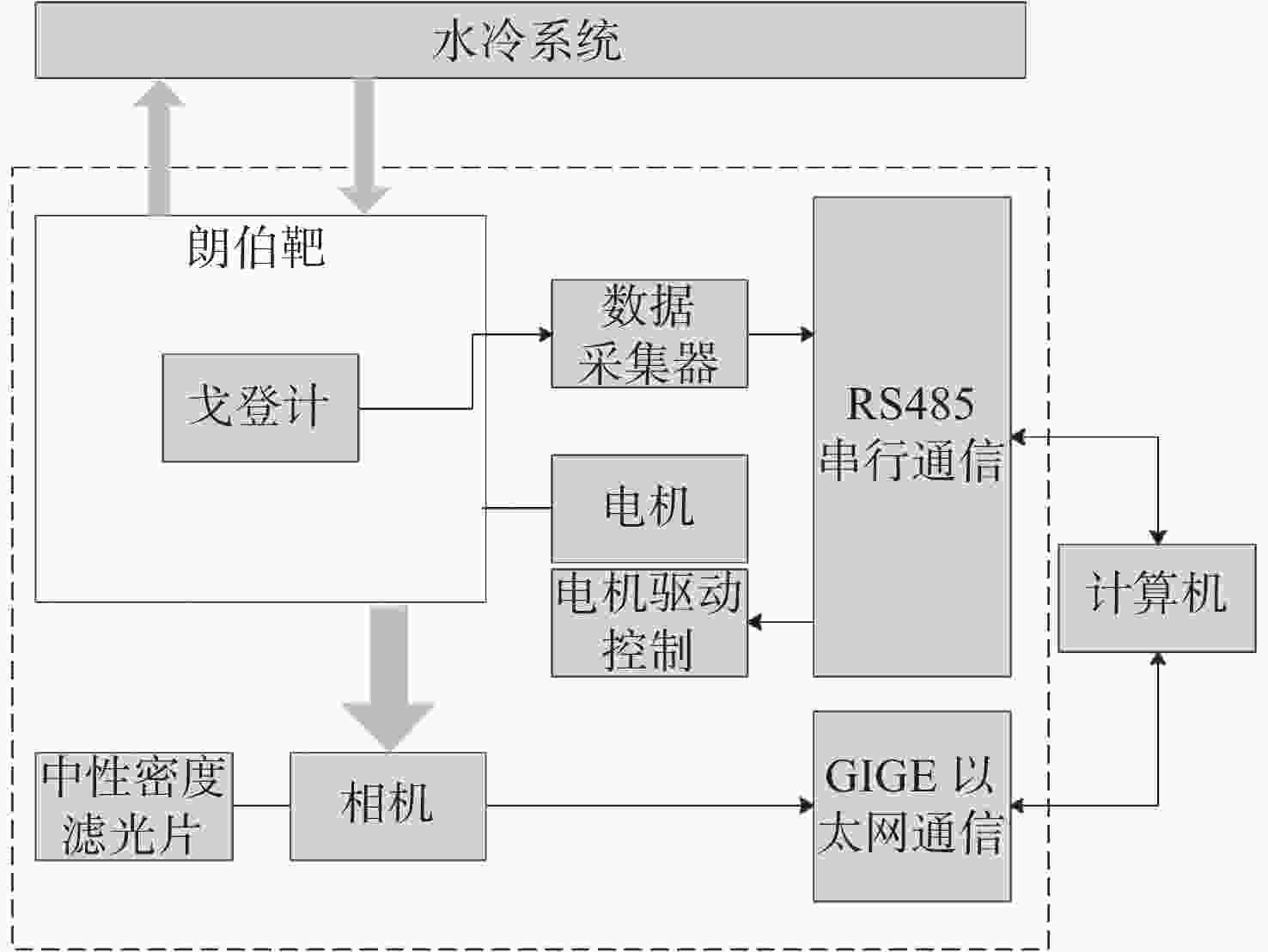
 下载:
下载:


